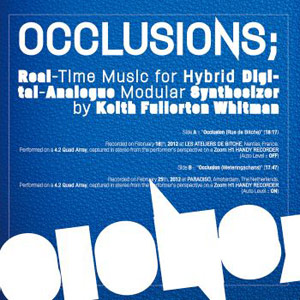Keith Fullerton Whitman Occlusions
There’s an overarching concept or a carefully prescribed set of parameters for just about everything […]

There’s an overarching concept or a carefully prescribed set of parameters for just about everything Keith Fullerton Whitman releases. On Occlusions, the framework turns out to be quite loose—he is to play a digital-analog modular synthesizer for 10 to 30 minutes with no pre-written or pre-recorded parts. Working boisterously within this precarious framework, Occlusions presents a particularly temperamental permutation of Whitman’s shifting, disorienting, and consistently fascinating mode of avant electronics.
Affable academic that he is, Whitman provides an illuminating bit of background for these two pieces in a statement accompanying the record. What we have are two different live “realizations” of “Occlusion,” approximately equal in length at about 18 minutes each. They were self-recorded at two European performances exactly one week apart in early 2012. For these two appearances, he was apparently in two drastically different moods, which viscerally manifest themselves in each performance. “Occlusion (Rue de Bitche),” recorded in Nantes, France, catches him in what he claims was a “mildly inebriated bliss.” His state of consciousness is reflected in the performance’s whimsical air. Beginning with the background sound of audibly French crowd chatter, the music takes off, traversing several nonlinear but continuously engaging minutes of jubilant fits, starts, and brief passages of free jazz-like pandemonium. It builds to a winding, relatively straightforward tick-tock rhythm, which is greeted with whoops from the audience but gets quickly suppressed by a cacophony of colliding synths.
Whitman claims that he meant to avoid any and all “divisible rhythms” in these performances, but he certainly wasn’t ardent about it. There are rhythmic moments that are borderline infectious, but these parts last no more than 10 to 20 seconds before Whitman appears to correct himself. Every time that it feels like matters are about to be resolved, or that a lasting quiet or a structured passage of some kind is about to set in, razor-sharp synthesizers cut through whatever was happening and ensure further disarray.
Disorder is the prevailing tone of the second recording herein, “Occlusion (Weteringschans),” a piece recorded in Amsterdam in the midst of what Whitman describes as an “arbitrarily triggered blind rage.” Beginning with the buzzing intensity of a wind-up alarm clock, this track operates in as freewheeling a mindset as the first track, but takes on a more disquieting, gnarly shape. Other than the instrumentation being used, there is no resemblance to the other performance. This one has more in the way of empty spaces and stark contrasts—the moments of quiet that punctuate the piece make the more severe moments all the more striking.
Occlusions is a companion piece of sorts to Generators, which was released earlier this year through Editions Mego. Occlusions draws from a similar sonic palette, and is driven by the same array of analog and digital synthesizers. However, where Generators was on a more cosmic synth trip in the vein of Terry Riley’s A Rainbow in Curved Air, this is a more damaged and haphazard set throughout, something fascinating and deeply relistenable.
Anyone who enjoys the comparatively serene and minimal Generators will want to hear the more careening, gritty Occlusions, and vice versa. For those who have never heard Whitman’s music, Occlusions provides a fabulous representation of both his performance instincts and how engaging and fun his music can be.

